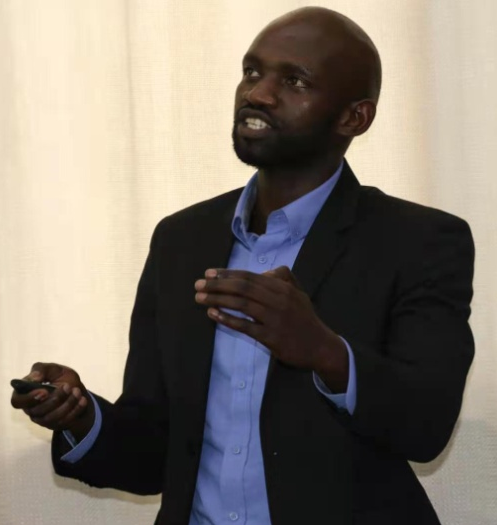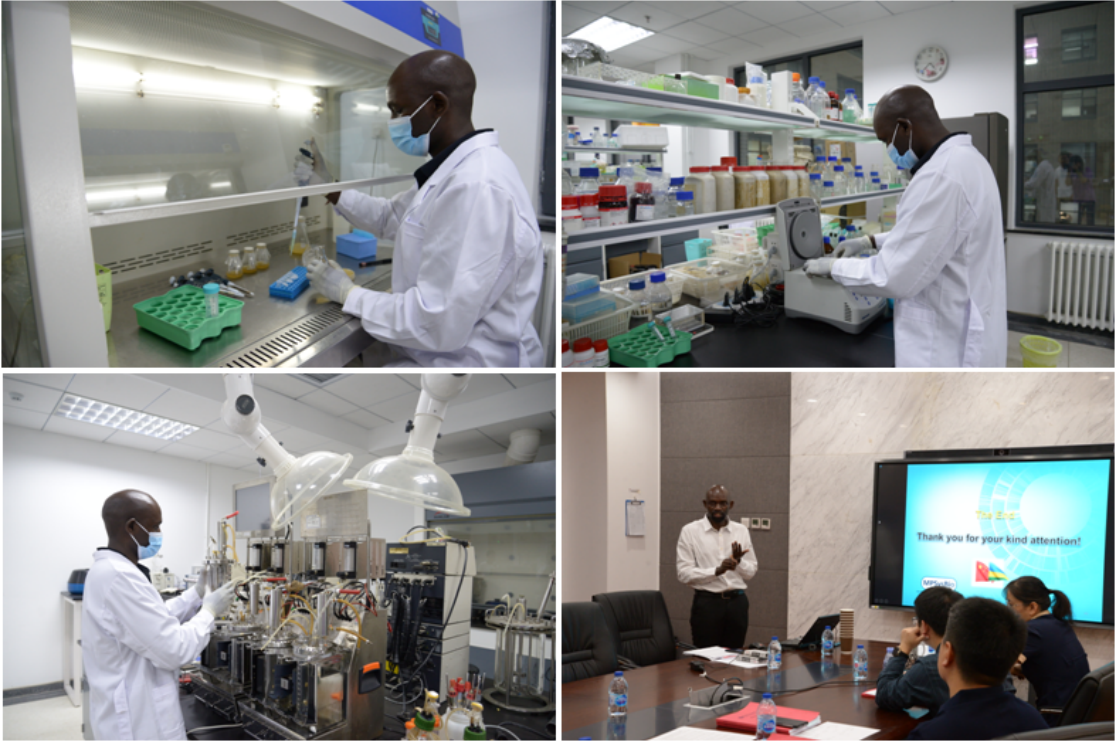Since 2013. over 50 foreign students from developing countries worldwide have got the support of Chinese Academy of  Sciences (CAS) and the World Academy of Sciences (TWAS), CAS-TWAS scholarship through CAS-TWAS Center of Excellence for Biotechnology, come to CAS for their PhD training, and have opportunities to do research in the top laboratories in China.
Sciences (CAS) and the World Academy of Sciences (TWAS), CAS-TWAS scholarship through CAS-TWAS Center of Excellence for Biotechnology, come to CAS for their PhD training, and have opportunities to do research in the top laboratories in China.
Dr. JEAN PAUL SINUMVAYO from Rwanda is one of the selected fellows, who was enrolled in 2017 as a PhD student in Professor Yin Li’s lab, in the Institute of Microbiology, CAS. Dr. Sinumvayo's research project was carried out at the State Key Laboratory of Microbial Physiology and Biotechnology where he mainly focused on Microbial “One-Pot” of Biofuels Production.
During the 4-year study in Prof. Li’s lab, Dr. Sinumvayo has published 5 articles in peer-reviewed journals with an average of at least one article each year. He was particularly working on development of engineered E. coli strain for butanol production from cellulosic materials. This brilliant idea brought by Dr. Zhao (a PhD from Prof. Li’s lab) was aimed to develop an E. coli consortium, where one E. coli strain uses C-6 sugars as substrate, and the other E. coli strain uses C-5 sugars, and the two strains each has the same pathway for butanol production. This so called “Y-shaped” consortium is expected to efficiently utilize C-6 and C-5 sugars for butanol production. Dr. Sinumvayo was involved in this project, and he contributed greatly in fermentation and the strain engineering. Finally, it was amazing that such a Y-shaped E. coli consortium could efficiently utilize both glucose and xylose for high-titer and high-yield production of butanol. This research was published in Metabolic Engineering, and Jean Paul shared the co-first authorship.
Inspired by the success of this “Y-shaped” consortium, Dr. Sinumvayo started to explore another idea that was to develop an E. coli consortium to produce butyl butyrate (BB), an important solvent. Engineered E. coli was reported to produce BB, but the titer was extremely low (at mg/L level). Implementation of this idea was to engineer the butanol-producing E. coli and butyrate-producing strain and let the butanol-and butyrate-producing E. coli strains work together to produce BB with the assistance of lipase. To this end, Dr. Sinumvayo successfully constructed a consortium of the two strains and achieved the highest BB production by E. coli after some optimizations. This research was published in Bioresources and Bioprocessing, and was selected by the Editor-in-Chief as the only monthly highlight in March 2021. The name “cognate consortium” was initially proposed by Jean Paul –and this is a very precise name to define the consortium he constructed.
Followed by the success of constructing a “Diamond-shaped” cognate consortium for BB production from glucose, Jean Paul also did some preliminary work on developing a cognate consortium for BB production from xylose and glucose. Basically, this is to combine the concept of “diamond-shaped” with the developed “Y-shaped” consortium. Very quickly, Dr. Sinumvayo demonstrated that the integration of the “Y-shaped” consortium and the “Diamond-shaped” consortium is able to produce a higher titer of BB from xylose and glucose, making a further step ahead on microbial BB production. With all these successes he wrote a review article entitled “Microbial production of butyl butyrate: from a single strain to cognate consortium”, which has recently published.
Apart from the publications and other contributions, Dr. Sinumvayohas received numerous awards from the Department or the Institute. For instance: Best Proposal Award implemented byCAS-TWAS Centre of Excellence for Biotechnology(2018);2nd Prize Scholarship of the Key Laboratory of Microbial Physiology and Metabolic Engineering, Institute of Microbiology, CAS(2020);and 2nd Prize Scholarship of the Key Laboratory of Microbial Physiology and Metabolic Engineering, Institute of Microbiology, CAS(2021).
Very recently, after careful rigorous review by the scholarship committee of UCAS, Dr.Sinumvayowas selected and won the2021Outstanding International Graduateof University ofChinese Academy of Sciences (UCAS).
Dr. Sinumvayo graduated in July 2021 from the Institute of Microbiology, CAS. He is planning to continue his research project with biofuel and green energy in East Africa. Since plenty of straw is available in East Africa, further research can be conducted to convert straw into glucose, which is sugar that can be fermented (broken down) to biofuels by microbes. Dr. Sinumvayo dreams for his next move is to make microbes the key to power cars in an environmentally sound way and filling up at the pump with fuel-based microbe.
Rwanda, as one of the African countries with aim to have economy based on science and technology, Dr. Sinumvayo's knowledge and skills can also be applied in other sectors such as food industry, biopharmaceutical industry as well as agriculture. With the professional skills and advanced technology he has learned in China, we believe a brilliant future is waiting for Dr. Jean Paul Sinumvayo, when collaboration, facilities and other resources are available.
